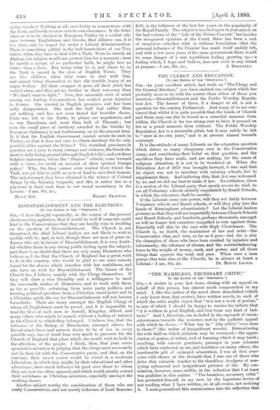DISESTABLISFIMENT AND THE ELECTIONS.
[TO THZ EDITOR OF THE "SPECTATOR.']
Sin,—I have thought repeatedly, in the course of the present electioneering agitation, that it would be well if some one could hint to the Conservatives that they are hardly wise in dwelling on the question of Disestablishment. The Church is not threatened, the chief Liberal leaders are not likely to wish to meddle with it ; and, in fact, though there are men of great in- fluence who are in favour of Disestablishment, it is very doubt- ful whether there is any strong public feeling upon the subject ; and there is no doubt that there are very many Dissenters who believe, as I do, that the Church of England has a great work to do in the country, who would be glad to see some remedy found for the abuses which interfere with her usefulness, and who have no wish for Disestablishment. The future of the Church lies, I believe, mainly with the Clergy themselves. If they will show a wise liberality and a willingness to meet the reasonable wishes of Dissenters, and to work with them as far as possible, refraining from mere party politics, and treating political questions from a Christian stand-point and in a Christian spirit, the cry for Disestablishment will not become formidable. There are many amongst the English Clergy of whom all Englishmen must be proud, and it is impossible to read the lives of such men as Arnold, Kingsley, Alford, and many others who might be named, without a feeling of interest in the Church to which they belonged. I believe, too, that the influence of the Bishop of Manchester, amongst others, his liberal-mindedness and earnest desire to be of use in every possible way, has of itself done very much to preserve for the Church of England that place which she would wish to hold in the affections of the people. I think, then, that your corre- spondent is mistaken in judging that the clergy must necessarily cast in their lot with the Conservative party, and that, on the contrary, their wisest course would be found in a moderate Liberalism, in which they might, by their educational and other advantages, have much influence for good over those to whom they are now too often opposed, and which would greatly extend their usefulness as Christian ministers, especially amongst the working-classes.
Another subject worthy the consideration of those who are really Conservatives, and not merely followers of Lord Beacons-
field, is the influence of the last few years on the popularity of the Royal Family. The subject is touched upon in your article on the last volume of the "Life of the Prince Consort," but besides the recognised opinions of the Court, there has been a sort of suspicion—whether with or without foundation—that the personal influence of the Premier has made itself unduly felt,. and with a few more years of the same government there would be some danger of a real republican feeling growing up,—a feeling which, I hope and believe, does not exist to any extent


































 Previous page
Previous page